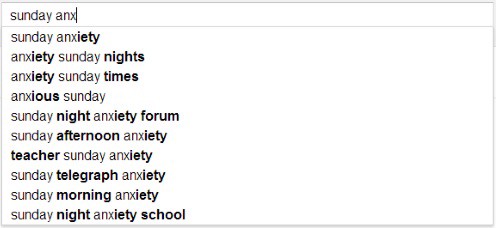Sundays Are Killing Us And They Must Be Stopped

In a bygone world, Sunday was a day of rest. It was sacred. In the workweek world, Sunday is a day for dread. It is where the rest of the week’s anxiety pools up; it is the day that, before going to sleep, we must bathe in our fears. This tradition is also sacred, but now it is under attack.
A traditional Anxiety Sabbath is scheduled as follows:
1. A late rise followed by overeating, which stretches far enough into the morning, or early afternoon, to create a sense of lost time.
2. Pause. First hint of dread.
3. Consternation: Unnecessary chores.
4. Momentary resolve: Necessary chores.
5. Regret: Where did the day go?
6. Reflections: How, each week, does Saturday morning propel you from your bed and into a vast world of promise and beauty? And then how does that world become a grim, pre-apocalyptic landscape, so full of foreboding, in just 24 hours? (Are your friends really your friends? You are getting older by the week and your family is too, you should call them but you are in no state to do so. Etc.)
7. Defeat: This is the stage at which your weekend is over and something else begins. It is the hour (6:00p p.m., give or take) after which all actions are a form of coping.
Sunday evening is meant to be a time for light reading and middlebrow TV; it is for catching up on stacks of magazines or Instapaper queues or world events that you chose to ignore for the seven days prior. It is a time to make one last desperate attempt to become whole for the week ahead. It is a time for the reciprocal soothing of partners. It is a time for hobbies and secrets, if you have them.
This is a miserable routine but a manageable one. Maybe even healthy! If the first part of your weekend should spin you down, maybe the second half should spin you back up: Saturday as post-week and Sunday as pre-week. (The stroke of midnight is the only moment of true stillness and peace. Pay close attention to it.)

Anyway: Now it seems the trials of the week — the things that we dread — are impinging on Sunday at an alarming rate. I blame email, in part. Certainly people have started sending workweek messages earlier, which is fine: This could count as “catching up.” But there is an increasing expectation that these emails be answered that day, which is a desecration.
A subtle shift in publishing has muddied the Sunday night routine, too. No longer content to WIN THE MORNING by publishing stories at midnight, publications are pulling their Monday pieces — and not just the media columns and the political profiles but ANYTHING that’s over 700 words and ready to publish — back into Sunday afternoon, feeding a bizarre and disorienting evening news cycle that leaves Facebook and Twitter effectively off limits. Publications now recognize Sunday afternoon not as an opportunity to get in front of a new cycle but as a cycle of its own. (Some institutions are moving pieces a full 24 hours back, to 12:01 a.m. Sunday, in an effort to scoop the Sunday magazines and shows. This is malice.) Non-observant news consumers spending Sunday evenings tweeting and arguing about these stories instead of reckoning with their own Sunday terrors are equally, or perhaps mostly, to blame. See: “Sunday Night Twitter.”
TV, once a strong ally against Sunday Dread, has become an enemy. At the time of writing, HBO doesn’t just have a single big-event Sunday night show, or a diverse lineup of Sunday night shows, but something that resembles a block: a weeknight-style 9:00 to 11:30 marathon designed to be watched all at once. Mad Men and The Good Wife suffer here as a result, to say nothing of the Nurse Jackies of the world. And we suffer too: Sunday night television is so densely packed that it needs its own, smaller Sunday — an extension, a grace period, something. Our new Sunday night is not soothing and it offers no escape. It serves the god of the week.
The options are not good here. If Sunday wants to behave like a weekday then maybe we should treat it like one. But no, gerrymandering Sunday into the week would kill us. Our alternative is difficult but potentially effective: Ban Sundays. Or really: Timeshift Sundays. Media and content and emails and WORDS delivered first on a Sunday must be queued and ignored for a time; we can fix our frantic, anxious Sunday evenings by delaying them seven days and then spreading them out over 12 or more hours (or piecemeal during the week, where each show, each chapter, and each article will be appreciated in full).
This has obvious disadvantages but it is delightfully defiant, and compromise is necessary. You may worry that you will feel behind on Monday morning, but that feeling won’t last. With less TV and news to talk about in those early hours, you will listen more. You will have time to look into your coworkers’ lidded, desperate, twitching eyes, and see the pain from which you have saved yourself.
